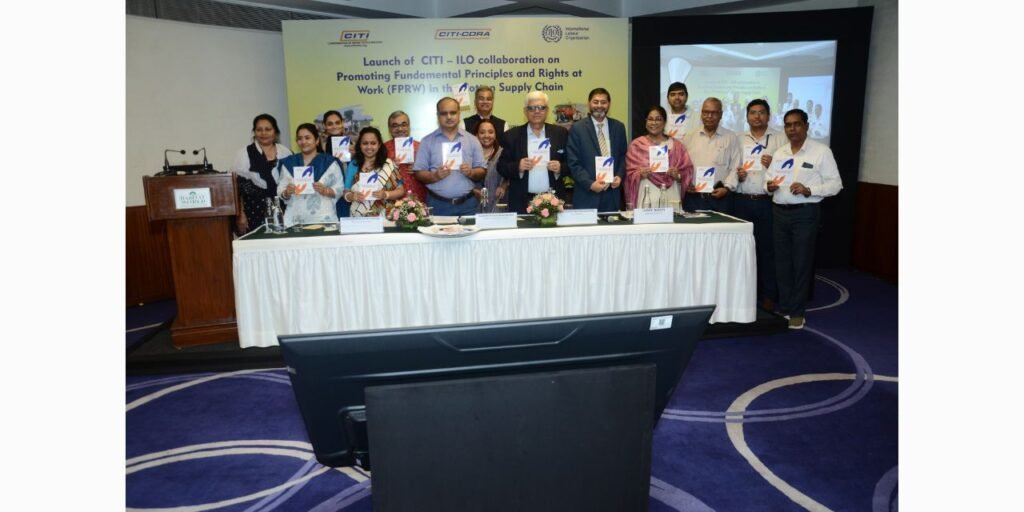
Delhi, August 13, 2024 — The Confederation of Indian Textile Industry (CITI), in collaboration with the International Labor Organization (ILO), has initiated a comprehensive initiative with the goal of advancing Fundamental Principles and Rights at labor (FPRW) among the community of cotton farmers. The first phase of the project will concentrate on the Major Madhya Pradesh districts that produce cotton.
Unveiled today at the Indian Habitat Centre in New Delhi, the program is a critical step in providing 6.5 million cotton farmers—of whom 40% are women—with fair labor standards, social protection, and sustainable livelihoods. Throughout the project, particular attention will be paid to little and migrant laborers working as cotton growers on leased land, as well as marginal farmers.
This initiative, which focuses on Madhya Pradesh’s cotton-rich areas, aims to empower small and marginal farmers by raising their understanding of worker rights, offering technical assistance for the execution of policies, and facilitating their access to vital social protection programs. An extensive pamphlet
At the opening, a detailed overview of the government programs accessible to farmers was also made public. The course will witness the distribution of such educational pamphlets and tutorials to farmers, providing a crucial resource for the community of cotton farmers.
The cotton supply chain in India is extensive and intricate, encompassing both formal and informal industries. As it moves into its next phase in Madhya Pradesh, the ILO’s “Promoting Fundamental Principles and Rights at Work (FPRW) in the cotton supply chain – Rise for Impact” initiative builds on the achievements and
insights gained from Telangana’s first implementation (2019–2022). This stage is in line with the CITI-CDRA’s continuous efforts under the cotton special project, guaranteeing the weaving of FPRW fundamental principles woven throughout routine farming operations.
Important Projects and Their Effects.
With the following goals in mind, the CITI-ILO partnership will spearhead many significant initiatives:
Communities who farm cotton are more empowered and conscious of FPRW
Capable stakeholders, institutions, and citizens who can guarantee FPRW
Stakeholders may now more easily access resources and information to advance FPRW.
Attendees at the Delhi launch ceremony included scientists studying agriculture, trade unions, senior government officials, and business executives. About thirty trainers who would be providing FPRW training to the participants in the project marked the start of the Training of Trainers workshops conducted in Indore. the next year, the project.
A fair and equal environment for our cotton farmers is being created thanks to the partnership between CITI and the ILO, as stated by Ms. Chandrima Chatterjee, Secretary General of CITI, during her introductory comments. By supporting FPRW, we hope to make sure that these diligent People are appreciated, acknowledged, and able to prosper in the global supply chain.
Dr. Siddhartha Rajagopal, Executive Director of TEXPROCIL, discussed the tactics and necessity of fortifying the cotton value chain via a robust agricultural sector, while Mr. Insaf Nizam, FPRW Specialist, ILO DWT for South Asia and CO for India, emphasized the significance of grassroots empowerment: “Knowing your rights and empowering smallholders is crucial to obtaining good job in the cotton industry. The goal of this initiative is to implement these ideas, affecting thousands of farmers. across all of Madhya Pradesh.
“The cotton we cultivate not only supports our domestic industry but also feeds into the global textile industry, influencing markets and economies worldwide,” said Shri Rakesh Mehra, Chairman of CITI, in remarks on the partnership. By making certain that our cotton is grown in an ethical and respectable manner circumstances, we not only support our farmers but also improve Indian cotton’s standing on the worldwide arena.”
For the last 54 years, CITI, through the Cotton Development and Research Association (CDRA), its extension arm, has worked to improve cotton output and quality by educating farmers about the best agronomic methods and providing them with the newest technology for plant and agricultural production. defense and control of nutrients. Over the course of its existence, CITI-CDRA has been able to impact cotton productivity, farmer income, soil health and better market linkage.”, said Shri T. Chairman of the CITI Standing Committee on Cotton is Rajkumar.
This collaboration between CITI and ILO comes at a pivotal moment when the cotton sector is dealing with a number of difficulties and marks a significant advancement in the goal of providing fair labor and sustainable livelihoods for India’s cotton growers. Important parties praised CITI and ILO’s work in this regard. Focusing on Madhya Pradesh, a vital area for the production of cotton, the initiative would establish new benchmark for initiatives to advance fundamental rights and principles at work that are not in not only the growing of cotton, but the whole agricultural industry.
